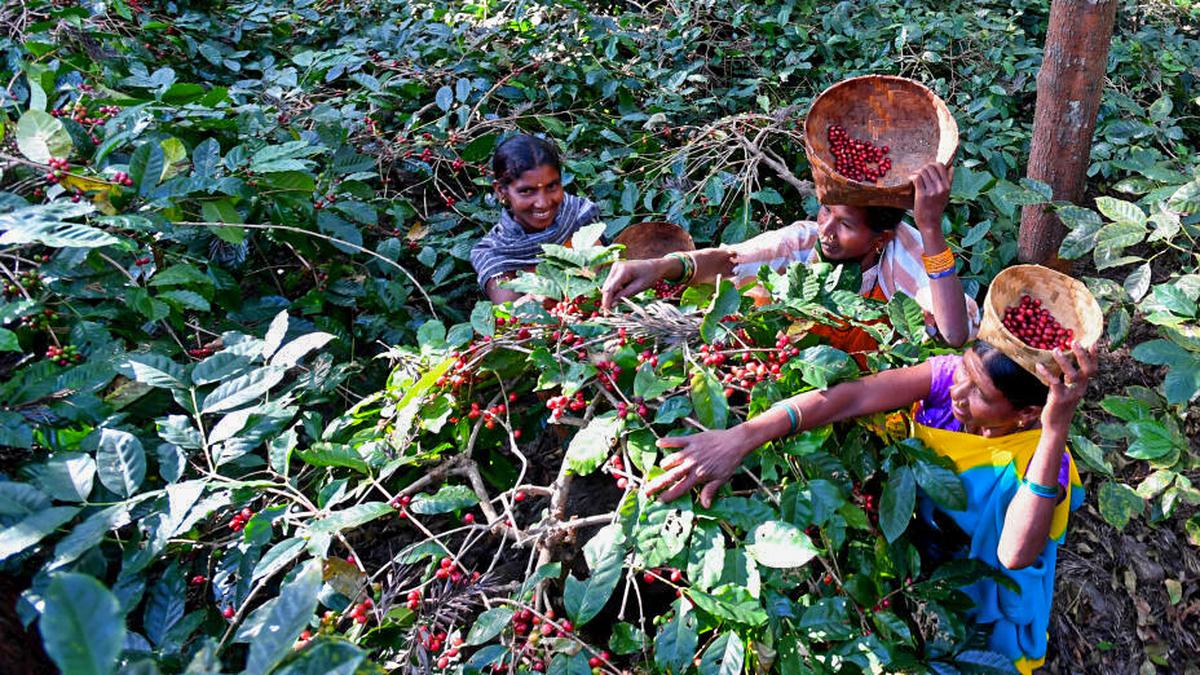
Soon, Araku coffee will be a ‘Made in Andhra Pradesh’ product as Girijan Cooperative Corporation sets up its own plant
The Hindu
GCC to set up Coffee Processing Unit in A.P. to make 'Make in A.P.' product. Unit to be built in 1.5 acres of land at Dounuru village, cost ₹5 crore. Construction to start in August, operations to begin in 2024-25. Benefits include cost savings, incentives for tribal farmers, export of coffee under 'GCC Araku Valley Coffee' brand.
The processing of Araku Valley coffee will soon be done in Andhra Pradesh, and the Girijan Cooperative Corporation (GCC) can claim it to be a ‘Make in A.P.’ product once its plans materialise.
The GCC currently depends on an outsourcing agency in Bengaluru for processing the coffee.
The GCC has finalised to set up a Coffee Processing Unit (CPU) in an extent of 1.5 acres of land it owns at Dounuru village of Paderu mandal in Alluri Sitharama Raju (ASR) district at a cost of ₹5 crore.
The GCC proposes to commence construction of the CPU in the auspicious month of ‘Nija Shravanam’ (which begins on August 18 as per Telugu almanac), and complete the work in five to six months so as to begin the operations at the unit from the 2024-25 financial year.
“Coffee processing entails various costs — outsourcing, loading, unloading and transportation — due to the tie-up with the outsourcing agency. This year, the government has decided to process the coffee locally and sanctioned ₹5 crore to establish the CPU,” GCC Chairperson Shobha Swathi Rani told The Hindu.
“The decision will not only help save money but also help the tribal farmers in the form of enhanced procurement charges and other incentives,” she added.
“At present, the GCC is giving ₹285 per kg of coffee beans to the farmers. We have received the Organic Certification for the top-grade coffee being cultivated by 2,600 tribal farmers at 82 villages of Chintapalli and G.K. Veedhi mandals. We will export the coffee under the ‘GCC Araku Valley Coffee’ brand after the first product rolls out of the CPU before the general elections in 2024,” Ms. Swathi Rani said.

“Writing, in general, is a very solitary process,” says Yauvanika Chopra, Associate Director at The New India Foundation (NIF), which, earlier this year, announced the 12th edition of its NIF Book Fellowships for research and scholarship about Indian history after Independence. While authors, in general, are built for it, it can still get very lonely, says Chopra, pointing out that the fellowship’s community support is as valuable as the monetary benefits it offers. “There is a solid community of NIF fellows, trustees, language experts, jury members, all of whom are incredibly competent,” she says. “They really help make authors feel supported from manuscript to publication, so you never feel like you’re struggling through isolation.”

Several principals of government and private schools in Delhi on Tuesday said the Directorate of Education (DoE) circular from a day earlier, directing schools to conduct classes in ‘hybrid’ mode, had caused confusion regarding day-to-day operations as they did not know how many students would return to school from Wednesday and how would teachers instruct in two modes — online and in person — at once. The DoE circular on Monday had also stated that the option to “exercise online mode of education, wherever available, shall vest with the students and their guardians”. Several schoolteachers also expressed confusion regarding the DoE order. A government schoolteacher said he was unsure of how to cope with the resumption of physical classes, given that the order directing government offices to ensure that 50% of the employees work from home is still in place. On Monday, the Commission for Air Quality Management in the National Capital Region and Adjoining Areas (CAQM) had, on the orders of the Supreme Court, directed schools in Delhi-NCR to shift classes to the hybrid mode, following which the DoE had issued the circular. The court had urged the Centre’s pollution watchdog to consider restarting physical classes due to many students missing out on the mid-day meals and lacking the necessary means to attend classes online. The CAQM had, on November 20, asked schools in Delhi-NCR to shift to the online mode of teaching.









